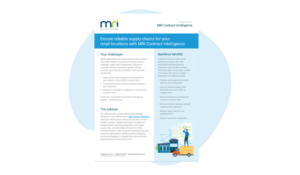Building a cohesive healthcare technology stack: the key to operational efficiency
In the complex healthcare industry, delivering high-quality patient care requires seamless collaboration across various departments. From facilities management to finance and sustainability, the need for integrated systems is more critical than ever. Unfortunately, many healthcare organisations still operate with disjointed technology platforms that hinder communication and efficiency. To truly improve operations and enhance patient care, it’s essential to build a cohesive technology stack that brings all departments together.
The challenge of disconnected systems
Healthcare operations are inherently complex, involving multiple stakeholders such as facilities managers, asset managers, finance directors, lease accountants, project managers and sustainability officers. Each department relies on specific data points to perform their duties effectively. However, when these departments use separate, incompatible systems, it creates silos of information that are difficult to access and analyse.
Disconnected systems lead to inefficiencies, duplication of effort and increased risk of errors. More importantly, they prevent healthcare organisations from fully leveraging their data to make informed decisions that could improve patient outcomes, reduce costs and ensure compliance with regulatory standards.
Streamlining facilities management with integrated solutions
Facilities management plays a crucial role in maintaining a safe and efficient healthcare environment. With an integrated technology platform, healthcare organisations can centralise their facilities management data, making it easier to track and complete maintenance tasks. This centralised approach ensures that both planned and reactive maintenance is conducted on time, within budget and in compliance with regulatory requirements.
By automating routine tasks and providing real-time access to facilities data, an integrated solution enables facilities managers to prioritise work based on urgency and resource availability. This not only improves operational efficiency but also ensures that the healthcare environment remains conducive to delivering high-quality patient care.
Enhancing financial operations and compliance
The finance department in healthcare is tasked with managing a vast array of assets and leases, all of which must comply with strict accounting standards. MRI’s integrated solutions simplify this process by providing tools for accurate capital and lease accounting. With automated compliance to standards including IFRS 16, healthcare organisations can reduce the risk of financial errors and streamline their reporting processes.
An integrated finance solution not only ensures compliance but also enhances the accuracy and efficiency of financial operations. By reducing manual data entry and improving access to financial data, these tools allow finance teams to focus on strategic planning and decision-making, rather than getting bogged down in administrative tasks.
Driving sustainability with centralised energy management
As sustainability becomes an increasingly important focus for healthcare organisations, effective energy management is essential. MRI’s energy management software allows healthcare providers to collect, measure and analyse energy consumption data from multiple sources. This centralised approach supports the development and implementation of comprehensive carbon reduction plans, helping organisations progress toward their sustainability goals.
With accurate, real-time data on energy use, healthcare organisations can identify opportunities to reduce costs and improve efficiency. Additionally, centralised energy management ensures compliance with environmental regulations and supports broader sustainability initiatives, contributing to a healthier environment for both patients and the community.
The power of a unified technology stack
In conclusion, the challenges of disconnected systems can no longer be ignored. To achieve operational efficiency and deliver the highest standard of care, healthcare organisations must adopt a unified technology stack that integrates all departments. MRI’s end-to-end solutions offer the tools needed to bring together facilities management, finance, asset management and sustainability into a cohesive, efficient system.
By investing in integrated technology, healthcare providers can eliminate silos, improve decision-making and create a more efficient, compliant and patient-centred organisation. The future of healthcare depends on the ability to work as one unified team and a cohesive technology stack is the foundation for success.
Contact MRI Software
If you want to learn more about how you can optimise your space, assets, resources, contracts and funding with MRI’s unified healthcare digital platform, request a demo or call us today on +44 (0)20 3861 7100.
Take your Retail Success to the Next Level with MRI’s Contract Intelligence
With the growing competition from online retailers, retail organizations are grappling with the complexities of supply chain management. Managing a network of product suppliers, navigating intricate contracts, and staying ahead of customer demands po…

